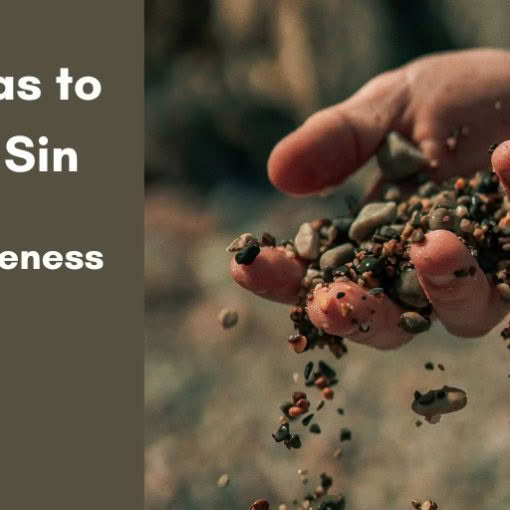Grief is hard, but grieving alone can be a torment of anguish, so we sit with the broken; we are silent and Shiva to the tears.
When my father cried loud and hard, I experienced a kind of solidarity in my grief. A child had died, and a funeral was had. I placed a small small casket into a tiny hole. It’s still there now.
Friends and family gathered and shared the loss. Yet, it still catches me whenever I drive past the resting place of one who never drew breath.
Life in this broken world can hand you questions and harshness that no answers can satisfy.
There is a time for everything.
There is a time for everything, and a season for every activity under the heavens: A time to be born and a time to die, a time to weep, a time to mourn, a time to search and a time to give up, a time to be silent and a time to speak. Ecclesiastes 3
But some people don’t know the times and the seasons for being quiet and sitting with brokenness. To sit with the sorrow of loss.
Sitting Shiva
In the Jewish tradition, part of the ‘time for everything’ is to sit Shiva.
I am not a Jew and have not experienced this, but here is what Wikipedia has to say.
Shiva (Hebrew: שִׁבְעָה šīvʿā, literally “seven”) is the week-long mourning period in Judaism for first-degree relatives. The ritual is referred to as “sitting shiva” in English. The shiva period lasts for seven days following the burial. Following the initial period of despair and lamentation immediately after the death, Shiva embraces a time when individuals discuss their loss and accept the comfort of others.
Its observance is a requirement for the parents, siblings, spouses, and children of the person who has died. It is not a requirement for an individual who was less than thirty days old at the time of death. At the funeral, mourners wear an outer garment that is torn before the procession in a ritual known as keriah. In some traditions, mourners wear a black ribbon that is cut in place of an everyday garment. The torn article is worn throughout the entirety of Shiva. Typically, the seven days begin immediately after the deceased has been buried. Following burial, mourners assume the halakhic status of avel (Hebrew: אבל, “mourner”). It is necessary for the burial spot to be entirely covered with earth in order for Shiva to commence. This state lasts for the entire duration of Shiva.
During the period of Shiva, mourners remain at home. Friends and family visit those in mourning in order to give their condolences and provide comfort. The process, dating back to biblical times, formalizes the natural way an individual confronts and overcomes grief. Shiva allows the individual to express their sorrow, discuss the loss of a loved one, and slowly reenter society. Wikipedia
As the article states, it dates back to biblical times. Joseph mourned the death of Jacob, his father, for seven days.
In the book of Job, we also find an example.
Job’s Three Friends Shiva
When three of Job’s friends heard of the tragedy he had suffered, they got together and traveled from their homes to comfort and console him.
Their names were Eliphaz the Temanite, Bildad the Shuhite, and Zophar the Naamathite.
When they saw Job from a distance, they scarcely recognized him.
Wailing loudly, they tore their robes and threw dust into the air over their heads to show their grief.
Then they sat on the ground with him for seven days and nights.
No one said a word to Job, for they saw that his suffering was too great for words. Job 2: 10-13
Job’s suffering was too great for words, but we will soon find that after sitting Shiva, they found the words, and they weren’t words of comfort.
For seven days, the friends got it right. They were in deep community with Job. They embraced the pain as if it was their own. Lavish attention was given to the soul of their friend.
Giving attention to the loss
Where have you experienced loss?
It may be the death of a loved one, but it could also be the loss of a dream, a marriage, a business, health, or a special relationship. Loss and death can come to us in so many ways. But has the Shiva been done?
I think in Western civilization, we don’t grieve well. In my culture of European heritage, we have the funeral, and then all is supposedly done. There is an expectation of getting back into life.
Sure it hurts, but you are supposedly meant to shake it off and make the best of it. Nobody comes and sits Shiva with you for seven days.
No one gives attention to the deepest pain one experiences when the relationship is gone beyond the grasp. No one sits and weeps.
Being alone is ‘not good,’ and that is why God created a helper. Someone to give attention to the soul of another.
Attention is the rarest and purest form of generosity. Simone Weil
What not to say in Shiva
Some advice comes from Jewish Funerals U.S.A.
By sitting there silently, you are saying more than words can.
You are saying: “I am here for you. I feel your pain. There are no words.”
And sometimes there aren’t any. Here are examples of things not to say:
- “How are you?” (They’re not so good.)
- “I know how you feel.” (No, you don’t. Each person feels a unique loss.)
- “At least she lived a long life.” (Longer would have been better.)
- “It’s good that you have other children,” or, “Don’t worry, you’ll have more.” (The loss of a child, no matter what age, is completely devastating.)
- “Cheer up – in a few months, you’ll meet someone new.” (He/she has just lost the other half of their soul!)
- “Let’s talk about happy things.” (Maybe later.)
And please don’t F.A.S.S. – Fix, Advise, Save or Set straight.
This is the season to restore in a spirit of gentleness and to bear another’s burdens. To represent the ‘with you’ of God.
A time to heal
A time to heal, a time to build, a time to laugh, a time to dance, a time to embrace, a time to mend, a time to speak, and a time to love.
There is a time for everything, and you can’t rush time. Some losses will take more time than others to process. There is no fixed prescribed allotment for you to ‘get over it.’
The loss will come in waves. Little things trigger the loss to reignite. That’s ok, it’s normal, it’s being human.
In this time of grief, we need others to express love simply by their presence and solidarity. It may come through a few words, but they will always carry a sense of ‘I am with you, and I’m not going to leave you alone.’
Grief is hard, but grieving alone can be a torment of anguish, so we sit with the broken, be silent, and give attention.
Quotes to consider
- Attention is the rarest and purest form of generosity. We have to try to cure our faults by attention and not by will. The will only controls a few movements of a few muscles, and these movements are associated with the idea of the change of position of nearby objects. I can will to put my hand flat on the table. If inner purity, inspiration or truth of thought were necessarily associated with attitudes of this kind, they might be the object of will. As this is not the case, we can only beg for them… Or should we cease to desire them? What could be worse? Inner supplication is the only reasonable way, for it avoids stiffening muscles which have nothing to do with the matter. What could be more stupid than to tighten up our muscles and set our jaws about virtue, or poetry, or the solution of a problem. Attention is something quite different. Simone Weil.
- No one person can fulfill all your needs. But the community can truly hold you. The community can let you experience the fact that, beyond your anguish, there are human hands that hold you and show you God’s faithful love. Henri Nouwen
- There are two things that draw us outside of ourselves: pain on other people’s faces; and the unbelievable beauty that is other human beings at their best. Or in other words: cross and resurrection. Richard Rohr -Job and the Mystery of Suffering
- We are saved by those whom we go to save, and both of us are then saved in spite of ourselves. There is a mysterious “third” who is doing the saving. Suffering for and with the other seems to be the only way we know that our lives are not about us. Richard Rohr -Job and the Mystery of Suffering
Question to consider
- What would it be like for some friends to come and be with you in your loss?
- Death is an obvious example of loss, but what other examples can you think of? What losses have you experienced?
- Attention is the rarest and purest form of generosity, according to Simone Weil. How does generosity express itself in being silent in the face of loss?
Further reading
Barry Pearman
Photo by Harli Marten on Unsplash





